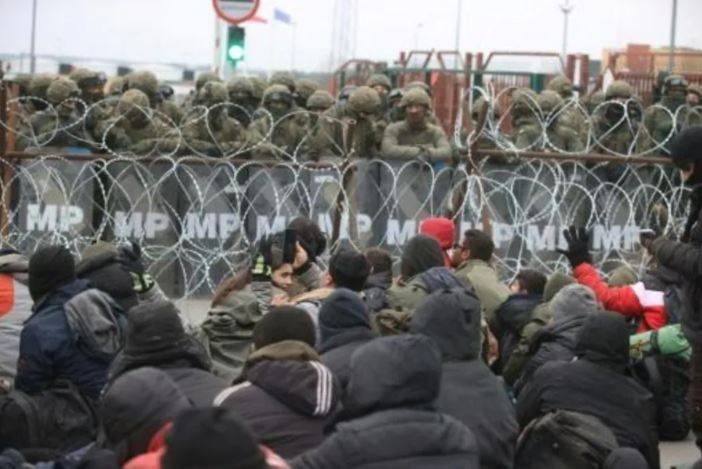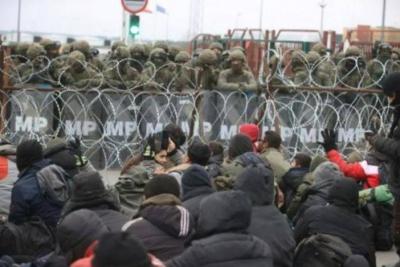Polish forces used tear gas and water cannons on Tuesday against migrants who were throwing stones from the Belarusian side while attempting to cross the border. Belarusian President Alexander Lukashenko confirmed his intention to avoid a "confrontation." According to estimates by the Polish border guards, around four thousand migrants are gathered along the border with Belarus under dire conditions as temperatures drop below freezing. Western powers accuse Belarus of instigating the crisis with Russian support by bringing migrants to the border to spark disputes within the European Union, which both Minsk and Moscow deny.
The confrontation began at the border crossing between Bruzgi in Belarus and Kuznica in Poland last week when hundreds of migrants gathered there in an attempt to enter the European Union. The Polish Ministry of Defense tweeted on Tuesday, "Migrants are attacking our soldiers and officers with stones and are trying to destroy the fence to cross into Poland," attaching a video showing clashes at the border. The Polish police announced that one of their officers suffered severe injuries, likely a skull fracture, "as a result of an attack by individuals driven by the Belarusian side," noting that sound bombs and tear gas canisters were thrown at Polish forces.
However, Minsk accused Warsaw of "escalating" the migrant crisis, with a spokesperson for the Foreign Ministry stating, "We are seeing direct provocations from the Polish side today and inhumane treatment of vulnerable individuals." Russia also condemned the use of tear gas and water cannons against migrants, with Foreign Minister Sergey Lavrov calling it "absolutely unacceptable."
Despite these developments, Lukashenko stated on Tuesday during a government meeting, "We cannot let this problem lead to a hot confrontation." He added, according to the official Belta news agency, "The main thing now is to protect our country and our people and to prevent clashes." France accused Belarus of staging a "horrifying spectacle" at the Polish border, with government spokesman Gabriel Attal telling the press, "They take thousands of desperate migrants, gather them at the border, take pictures themselves [...] to provoke divisions among us and fragment us in Europe, and to instill fear among Europeans."
These remarks came a day after a phone call between Lukashenko and German Chancellor Angela Merkel, which was viewed as a victory for the Belarusian president at a time when Western leaders have been boycotting him since his controversial re-election in August 2020. Merkel's office indicated that discussions took place about delivering humanitarian aid to the migrants, many of whom are children. Lukashenko stated that he and Merkel agreed on the need to de-escalate the crisis, saying, "We agreed that escalation does not serve either side, neither the European Union nor Belarus." However, he indicated that there are differences in views with Merkel regarding how the migrants arrived in Belarus, with the West accusing Minsk of bringing them in response to European sanctions imposed for its brutal crackdown on the opposition following the disputed presidential elections in 2020.
EU foreign ministers agreed on Monday to expand sanctions "in the coming days" to include "a large number" of individuals and entities for their role in "facilitating illegal crossings of the EU border." The United States also intends to expand its sanctions on Belarus.
Regarding the return of Iraqi migrants, Iraq announced that it would begin organizing "voluntary return" flights for its nationals stranded at the Belarus border starting this week. The Iraqi embassy in Moscow reported on Tuesday that it would repatriate about two hundred citizens on a flight scheduled for Thursday. However, many migrants, including those interviewed by AFP, do not intend to return. Meanwhile, the European Union has demanded a halt to flights to Belarus. The Belarusian airline Belavia announced on Monday that it is now prohibited for Syrians, Iraqis, Yemenis, and Afghans to board flights from Dubai to Belarus, following similar restrictions imposed by Turkey last week. Nevertheless, many migrants who have often borrowed money to pay for the journey appear determined to stay, despite the difficulties in obtaining food and basic necessities. The Belarusian Red Cross announced that it distributed three tons of aid on Tuesday.




